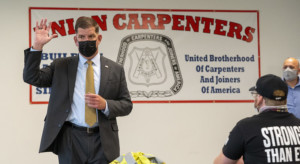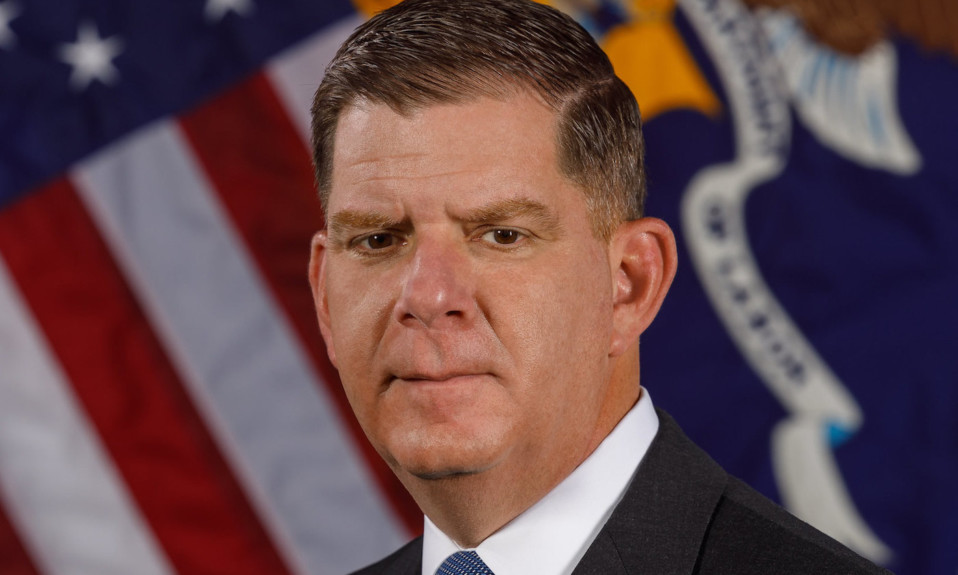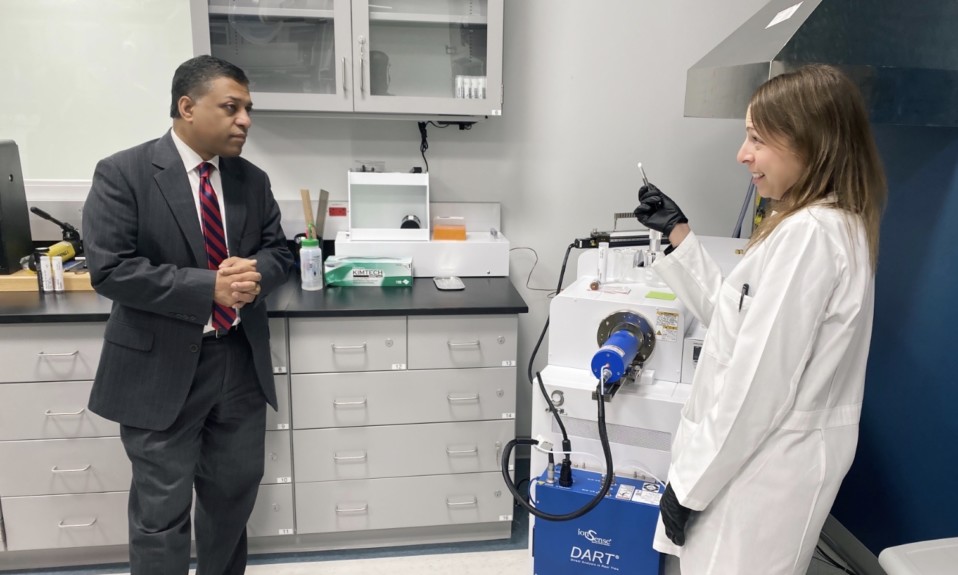The Secretary of Labor spoke with TreatmentMagazine.com about a wide range of addiction-oriented issues
By Jason Langendorf
Marty Walsh is more than a high-profile political figure—he’s also a man who’s been in recovery for over two decades.
A former two-term mayor of Boston and longtime member of the Massachusetts House of Representatives (13th Suffolk District), Walsh assumed the office of U.S. Secretary of Labor on March 23, 2021, after being selected to fill the role by President Joe Biden. The appointment marked the pinnacle of his career.
I knew I had a problem with alcohol. I knew that every time I drank, it didn’t lead to good situations and it didn’t end well, meaning embarrassment, blackouts, or whatever it may be. For a while, I wanted to stop. I just didn’t know how to stop.”—Marty Walsh
His personal history with addiction has been reflected in his professional initiatives. As Boston’s mayor, Walsh made helping people with addiction a priority, launching a 24-hour recovery hotline, equipping every public safety vehicle in Boston (police, firefighters, EMTs) with the overdose-reversal drug naloxone and assuming the role of chairman of a newly formed substance abuse task force that connected the mayors of major metro cities across the country. Under Walsh’s leadership, and with a $1.9 million investment from the city, Boston opened the Engagement Center (EC) in the Mass/Cass area, an around-the-clock safe space for people with addiction and homelessness to spend time and receive services, including medical help and recovery and housing referrals.
In recognition of National Recovery Month, Walsh, 54, spoke to TreatmentMagazine.com about his own recovery, his contributions to the addiction treatment and recovery space, and U.S. drug and substance policy.
Q: September is National Recovery Month. What is the significance of the month for you?
A: Since I’ve been in elected office, I’ve always celebrated National Recovery Month. It’s about celebrating recovery but [also about] understanding that the work is never done. We have to teach to work every day, whether it’s supporting people to get into recovery or people already in recovery. It’s a day-at-a-time program.
Q: We’re only just beginning to understand the weight of stigma for people who are struggling with addiction, and you’ve been very candid about your own recovery. Did you grapple with that stigma or any potential fallout from opening up about your experiences as a public figure?
A: I didn’t—I didn’t feel any of it. I think it’s important for people who are in recovery to understand that a lot of times stigma is in your head. You think people are looking down on you, when, in fact, you’re turning your life around completely and people are recognizing the changes in you in a very positive manner. And in a helpful and happy manner.
I think people deserve second chances. Whether it’s substance use disorder or alcoholism or whatever, we should be creating pathways and opportunities for those people. They’re no different than any other workers you have.”—Marty Walsh
When I first got into recovery, people would come up to me and say, “You look great, you look great, you look great.” And that was some of the energy I needed to continue to move forward at that time. But I do think that when it comes to stigma, we have to do more work in the space of employment. Whether it’s substance use disorder or alcoholism or whatever—we should be creating pathways and opportunities for those people. They’re no different than any other workers you have.
Q: Was there an inflection point for you, a moment when you knew it was time to get help?
A: Yeah, I didn’t want to go into recovery; I didn’t want to go into detox. I mean, I don’t think anyone wants to go. But there was a lot of pressure, a lot of heat, a lot of really difficult situations in my life. It kind of all came together. I ended up going down to detox, and I didn’t want to go there. On my way there, I don’t think the intention was to get sober. I’m not really sure if I knew what full sobriety was at that point. The first night I was in treatment, [there was] an Alcoholics Anonymous meeting. I came in, and one of the speakers spoke. I don’t really remember what they said. But I realized there was something else here, and I was fortunate from that point on just to listen. I listened to the suggestions from counselors and the people working there.
A: You sometimes hear people in recovery say they experienced a moment of awakening. But you’re saying you showed up and thought, Look, I don’t want to be here.
A: I mean, I think the awakening came the first day I was there, when the first speaker spoke and I realized, Wait a second, there’s something here. Obviously, I knew I had a problem with alcohol. I knew that every time I drank, it didn’t lead to good situations and it didn’t end well, meaning embarrassment, blackouts, or whatever it may be. For a while, I wanted to stop. I just didn’t know how to stop, even though there were people in front of me who I knew I could reach out to and I knew there were things I could do. But I just didn’t do those things.

Q: How have those experiences with addiction and recovery translated to your position as Secretary of Labor?
A: It applies completely. I live my life a day at a time, and as Secretary of Labor, there are lots of opportunities for me to try and help people in recovery, whether it’s through APsaA [American Psychoanalytic Association]—a department that works on the mental health and substance use parity law—or whether it’s just being an example, a day at a time. As Secretary of Labor, I’ve had a chance to go to two treatment facilities and share my story, and then talk to the leadership of those programs. It helps me every day with challenges that come up in my life. It helps me every day with how I operate. I live my life literally a day at a time.
Q: As mayor of Boston, you created the Office of Recovery Services—the first of its kind. What was its function, and what was the impetus behind its establishment?
A: I established it because when I was running for mayor, I realized there was a need to go deeper and do more in the recovery space in this country. As a state representative, I did a lot of work helping programs get funded, and I was on the board of the Gavin Foundation, which is a treatment program that operates halfway houses, detoxes. As mayor, I thought some places we’re treating substance use as a crime. If you can get the substances and the alcohol out of people’s bodies, they don’t commit crimes. So, I made a commitment that we’re going to do that, and we did.
That office works on issues from street addiction to creating pathways for people to making sure that we have good systems in the city of Boston. We collaborate with other programs – obviously, we don’t deliver a lot of the programs ourselves. We have a part of Boston called Mass and Cass, where a lot of people who are sick and suffering hang out and use drugs. The press has focused on thinking it’s a homeless issue. It’s not a homeless issue—it’s an addiction issue, a substance use issue. Folks out there are sick, and we need to help get them services. The problem is, you can’t force somebody into services, so we have to literally work one person at a time.
When it comes to the government, I think we need to have a stronger national policy when it comes to substance use disorder. The federal government generally assists states in programs, but not all states have good, strong programs. In some states—which shocks me—there’s still resistance to needle exchange programs.”—Marty Walsh
Q: Are there any initiatives that you believe could be scaled up effectively on a national level?
A: Recovery Services is similar to SAMHSA [Substance Abuse and Mental Health Services Administration], but I think we have to go deeper in the conversation. When we think about what we’re doing with addiction and what we’re doing with substance use disorder, it’s working for the people who are going to treatment. But on a larger scale, we have bigger issues: any type of drug, really, but heroin, fentanyl, crystal meth, pills. We have to have to come up with some stronger policies. We need more money going into recovery, and we need better pathways into recovery for people.
Q: You’ve had a central role in responding to the COVID-19 pandemic and its effects. What have you observed in terms of unique difficulties or challenges for people who are suffering from addiction during the pandemic?
A: We’re telling people to stay at home, to not interact with other people—to isolate, basically. But this is a disease of isolation. I knew as we kept going forward with the virus that lots of people were going to be affected by this. Most of the recovery programs—like Alcoholics Anonymous—went to Zoom, so you don’t have that human touch, that personal touch inside a hall. I’m concerned about the impact that we’re going to have here—the long-term and short-term impacts. What I mean by that is getting people back into programs, reaching out to people. I think we’ll get back to strong recovery programs in this country, including Alcoholics Anonymous and NA [Narcotics Anonymous], but it’s going to take a little bit of time.
A lot of people are at a serious disadvantage because of either their insurance companies or their states or cities not having the right programming and enough help to handle the issue. We’re burying too many people because of addiction.”—Marty Walsh
Q: If the pandemic drags on, especially in light of the variants, we can expect a lot of people with addiction to deal with the aftereffects of that isolation, right?
A: I can say this: In the recovery community, my advice is to reach out to somebody who you haven’t talked to in a while to make sure they’re okay. Sometimes all people need is that hand. When it comes to the government, I think we need to have a stronger national policy when it comes to substance use disorder. The federal government generally assists states in programs, but not all states have good, strong programs. In some states—which shocks me—there’s still resistance to needle exchange programs. People are still looking at addiction as a crime. The people who are struggling with substance use disorder are you kids, your grandchildren. I don’t understand how we can still make that mistake [of viewing them as criminals]. That’s the stigma I get worried about—treating it as a crime. It’s a disease.
Q: So , if you could make a change in federal drug policy, what would it be?
A: Strengthen the patrolling of keeping drugs out of the country. There’s far too much heroin in America. There’s far too many illegal drugs getting into the country. I would increase our enforcement policy, number one. Number two, create better pathways for everyone in the country to treatment. A lot of people are at a serious disadvantage because of either their insurance companies or their states or cities not having the right programming and enough help to handle the issue. We’re burying too many people because of addiction, and part of it is a lack of access to meds.
Q: Does it just come down to funding?
A: It’s all funding, unfortunately. Funding and a willingness, in some states.













